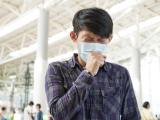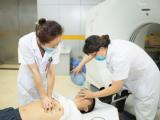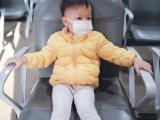Apr 4, 2003 (CIDRAP News) – Cases of severe acute respiratory syndrome (SARS) in the United States and worldwide jumped significantly today, but most patients in the United States have recovered and none have died, according to health officials.
The United States now counts 115 cases, up 15 from yesterday, in 29 states, said Dr. James Hughes of the Centers for Disease Control and Prevention (CDC). Twenty-seven patients are currently hospitalized, and the same number have had evidence of pneumonia, said Hughes, director of the National Center for Infectious Diseases.
"We're very encouraged that most patents have recovered from this illness in the United States," he said at a news briefing this afternoon.
The worldwide SARS case count today climbed to 2,353 in 18 countries, with 84 deaths, an increase of 83 cases and 5 deaths since yesterday, according to the World Health Organization (WHO). Today's tally includes 30 new cases, with 3 deaths, in mainland China, which has just begun submitting daily electronic reports of cases and deaths to WHO. Mainland China alone accounts for 1,220 cases and 49 deaths, and another 761 cases and 17 deaths have occurred in Hong Kong, according to WHO.
A WHO team headed by a CDC physician arrived in China yesterday to investigate the outbreak. The team was working in Guangdong province, where SARS apparently originated last November.
Chinese authorities have come under criticism for withholding information about the outbreak, but they are reported to be cooperating now. Li Ming, director of the Chinese Center for Disease Control, today apologized for the agency's communication performance, the Associated Press reported. He spoke at a news conference to which foreign news organizations were not invited.
US Health and Human Services Secretary Tommy Thompson announced today that China's health minister, Zhang Wenkang, has agreed to increase cooperation with US and world health officials to investigate and combat SARS. Thompson said he had a 45-minute telephone conversation with the minister.
"The minister of health was very cooperative," Thompson said in a news release. "We're going to continue talking, and he wants to do more with the Department of Health and Human Services."
At the CDC briefing, Hughes said Chinese cooperation has "improved dramatically" in recent days.
Though Hughes reported no major advances in the SARS investigation, he said mounting evidence points to a previously unknown coronavirus as the cause of the illness. "Evidence for this previously unrecognized coronavirus has been found in at least ten laboratories," he said.
CDC has cultured the virus from specimens from four patients, he said. Electron microscopy, polymerase chain reaction, and other lab tests have also yielded evidence of the virus in varying numbers of patients. Histopathologic studies have shown "diffuse alveolar damage" in four specimens, he added.
"We're going to be trying very soon to transfer some of these tests to the state laboratories through the Laboratory Response Network," Hughes said.
Concerning possible treatments, Hughes said clinical experience suggests that the antiviral drug ribavirin has some effect, and studies are being planned to assess its value. CDC and other agencies are also testing additional antivirals.
In an effort to assess the attack rate for SARS, CDC is planning to look at a cohort of Americans who stayed in Hong Kong's Metropole Hotel, which apparently played a key role in the disease's spread to several other regions after an ill Chinese professor stayed there in February.
Hughes said it still appears that SARS is mainly transmitted through respiratory droplets, so that fairly close contact with an infected person is necessary to contract the disease. However, "It's not possible to exclude airborne transmission," he said.
In contrast to the United States, Canada has had seven deaths among 69 SARS patients. Hughes said the difference appears to be mainly a matter of luck, in that an infected person flew from Hong Kong to Canada and infected others there before the SARS outbreak was clearly recognized.
See also:
WHO update
http://www.who.int/csr/sarsarchive/2003_04_04/en/
WHO case count
http://www.who.int/csr/sarscountry/2003_04_04/en/




















